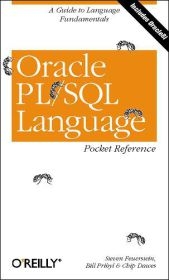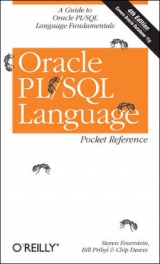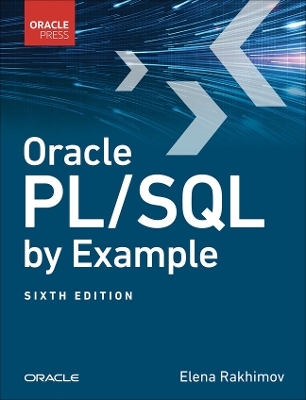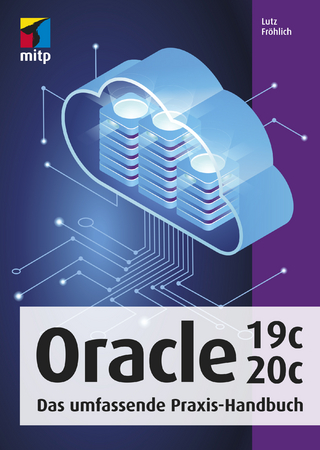
Oracle PL/SQL Language Pocket Reference
O'Reilly Media (Verlag)
978-0-596-00680-8 (ISBN)
- Titel erscheint in neuer Auflage
- Artikel merken
While it's good to have a book with all the answers--like your trusty copy of Oracle PL/SQL Programming-- how often do you need all the answers? More likely, you just need a reminder, a quick answer to a problem you're up against. For these times, nothing's handier than the new edition of the Oracle PL/SQL Language Pocket Reference by PL/SQL experts Stephen Feuerstein, Bill Pribyl, and Chip Dawes. Newly updated for Oracle10g, this little book is always at the ready for the quick problem solving you need. The third edition of this popular mini-reference boils down the most vital information from Oracle PL/SQL Programming into a handy guide to PL/SQL basics. The book includes fundamental language elements, such as block structure, identifiers, variables, datatypes, ad declarations; statements for program control, cursor management, and exception handling; the basics of records, procedures, functions, triggers, and packages; and the calling of PL/QL functions in SQL. And there's more.
This concise guide also covers Oracle objects, collections, external procedures, Java integration, and new Oracle 10g elements like regular expressions, compile-time warnings, more implicit conversion, FORALL support for non-consecutive indexes, and more. The amount of valuable information packed into this slim volume--intelligently arranged for quick accessibility--make this an indispensable reference for new and seasoned Oracle database developers alike. O'Reilly's Pocket References have become a favorite among developers and database administrators everywhere. By providing a wealth of important details in a concise, well-organized format, these handy books deliver just what you need to complete the task at hand. When you've reached a sticking point in your work and need to get to a solution quickly, the third edition of Oracle PL/SQL Language Pocket Reference is the book you'll want to have.
Steven Feuerstein is considered one of the world's leading experts on the Oracle PL/SQL language. He is the author or coauthor of Oracle PL/SQL Programming, Oracle PL/SQL Best Practices, Oracle PL/SQL Programming: Guide to Oracle8i Features, Oracle PL/SQL Developer's Workbook, Oracle Built-in Packages, Advanced Oracle PL/SQL Programming with Packages, and several pocket reference books (all from O'Reilly & Associates). Steven is a Senior Technology Advisor with Quest Software, has been developing software since 1980, and worked for Oracle Corporation from 1987 to 1992. Bill Pribyl, author, teacher, and software consultant,is the primary author of Learning Oracle PL/SQL and the coauthor of Oracle PL/SQL Programming and its companion pocket reference, all published by O'Reilly & Associates. An Oracle user since 1986, Bill has consulted on many aspects of using Oracle products. He recently spearheaded PLNet.org, a Web-based repository where developers can share open source PL/SQL. Chip Dawes has been building and maintaining systems on relational databases since 1988 and with Oracle since 1990. He is currently a consultant with D&D Technologies, a Chicago consultancy. He enjoys working with, lecturing on, and writing about Oracle database administration, client server application development, and Unix system administration. Chip is an Oracle Certified Professional and earned computer science and aerospace engineering degrees from St. Louis University.
Introduction Acknowledgments Conventions PL/SQL Language Fundamentals PL/SQL Character Set Identifiers Boolean, Numeric, and String Literals Numeric Literals Datetime Interval Literals Delimiters Comments Pragmas Statements Block Structure Variables and Program Data Scalar Datatypes NLS Character Datatypes LOB Datatypes Implicit Datatype Conversions NULLs in PL/SQL Declaring Variables Anchored Declarations Programmer-Defined Subtypes Conditional and Sequential Control Conditional Control Statements Sequential Control Statements Loops Simple Loop Numeric FOR Loop Cursor FOR Loop WHILE Loop REPEAT UNTIL Loop Emulation EXIT Statement Loop Labels Database Interaction Transaction Management Autonomous Transactions Cursors in PL/SQL Explicit Cursors Implicit Cursors Dynamic Cursors Cursor Variables Cursor Expressions Exception Handling Declaring Exceptions Raising Exceptions Scope Propagation Records in PL/SQL Declaring Records Referencing Fields of Records Assigning Records DML and Records Nested Records Named Program Units Procedures Functions Parameters Triggers Creating Triggers Trigger Predicates DML Events DDL Events Database Events Packages Package Structure Referencing Package Elements Package Data SERIALLY_REUSABLE Pragma Package Initialization Calling PL/SQL Functions in SQL Calling a Function Requirements and Restrictions Calling Packaged Functions in SQL Column/Function Name Precedence Oracle's Object-Oriented Features Object Types Type Inheritance Methods Methods in Subtypes Manipulating Objects in PL/SQL and SQL Upcasting and Downcasting Changing Object Types Collections Declaring a Collection Initializing a Collection Adding and Removing Elements Nested Table Functions Collection Methods Collections and Privileges Nested Collections Bulk Binds External Procedures Creating an External Procedure Parameters Java Language Integration Example Publishing Java to PL/SQL Data Dictionary Regular Expressions (Oracle Database 10g) Metacharacters REGEXP_LIKE REGEXP_INSTR REGEXP_SUBSTR REGEXP_REPLACE Match Modifiers Reserved Words Index
| Erscheint lt. Verlag | 11.5.2004 |
|---|---|
| Verlagsort | Sebastopol |
| Sprache | englisch |
| Maße | 114 x 178 mm |
| Gewicht | 144 g |
| Einbandart | kartoniert |
| Themenwelt | Informatik ► Datenbanken ► Oracle |
| Mathematik / Informatik ► Informatik ► Programmiersprachen / -werkzeuge | |
| ISBN-10 | 0-596-00680-2 / 0596006802 |
| ISBN-13 | 978-0-596-00680-8 / 9780596006808 |
| Zustand | Neuware |
| Haben Sie eine Frage zum Produkt? |
aus dem Bereich



